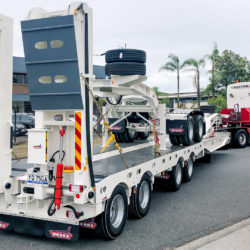The Performance-Based Standards (PBS) initiative was introduced over ten years ago by the National Heavy Vehicle Regulator (NHVR) to increase heavy vehicle efficiency and vehicle safety across the country’s roads.
PBS in action
![]()
PBS-approved vehicles must adhere to a set of well-documented standards, which aim to reduce fuel consumption and, in turn, carbon emissions and road maintenance costs. In return, drivers can enjoy between 15 and 30 per cent more productivity compared to regular vehicles.
National Transport Commission Chief Executive Paul Retter adds that the PBS “means the same freight task can be delivered with fewer vehicles on the roads”. We have covered the PBS scheme in depth in a recent blog post for those who would like technical information about how it works.
The scheme has been warmly received by the transport industry at large, but, as Mr Retter attests, transport vehicle owner take-up has not matched early expectations. Potential barriers to wide-range participation in the initiative may include barriers to access, which must be addressed by the scheme’s operators in the future as the industry evolves.
Key recommendations for PBS changes
![]()
Recently, the NTC has made several key recommendations that are designed to address these barriers and make the scheme easier to understand, sign on for and take advantage of. From there, the original targets for road safety, environmental protection and overall vehicle productivity increases can be met, making the roads a better and safer place for the nation’s truck drivers and owners to work on.
Among the recommendations listed, the key one was that states and territories should allow as-of-right access for PBS-approved vehicles to drive along PBS-sanctioned roads. In other words, vehicles that have already obtained PBS certification should automatically be allowed to be on the PBS road network with having separately-requested approval. Obtaining this concession would dramatically decrease the barriers to the scheme as it allows vehicles on the road quicker with less administrative overhead.
Additionally, there was a recommendation for Austroads to make road guidelines consistent across the entire country, instead of having different standards for road quality and bridge sizes in each state.
One of the biggest recommendations was for the PBS standards to be regularly reviewed with an eye on implementing new vehicle technologies as they become available and standardised. Existing PBS standards were initially drafted almost 20 years ago before the advent of anti-lock braking and roll-over protection systems, making many of the safety requirements potentially out of date.
Finally, more work in promoting the benefits of the PBS scheme was requested. The review found that there are significant advantages to the scheme, including the saving of an estimated 94 million litres of fuel in 2016 alone, so the promotion will be in everyone’s interests.
The road ahead
![]()
These recommendations were approved and the NTC’s next task is to work with road managers, the NHVR and Austroads to make the changes happen as quickly as possible.
With over 16,000 PBS-certified trucks, trailers and buses operating in Australia currently, the PBS scheme is quickly proving its worth and the organisation looks forward to greatly increase this number in the coming years. Further reviews will be commissioned to ensure that new developments in driver safety and vehicle performance will be taken into consideration.
The Drake Group is a proud supporter of the work done in this area through PBS. To find out about how we ensure that our heavy haulage trailers are PBS-compliant, contact The Drake Group today.
The NTC will now work closely with road managers, the NHVR and Austroads to implement the recommendations of the review.


